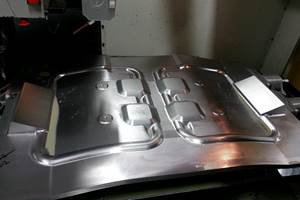Thread Rolling Heads Keeps The Wheels Of Racing Turning
During an auto race, where fractions of a second mean the difference between winning and losing, nobody wants to stop and examine the thread quality of a wheel stud. Yet wheel stud threads are extremely important, especially when you consider that the driver's safety and millions of dollars are at stake.
Share





During an auto race, where fractions of a second mean the difference between winning and losing, nobody wants to stop and examine the thread quality of a wheel stud. Yet wheel stud threads are extremely important, especially when you consider that the driver's safety and millions of dollars are at stake.
With this in mind, Curtis Goodman, President of MSI Racing Products, does everything in his power to produce high quality products that go unnoticed during race time. MSI, located in Troutman, North Carolina, manufactures wheel studs and nuts for some of the best racing teams in the world, including the Winston Cup and Busch Grand National teams. Mr. Goodman rolls all his threads and forms his knurls on CNC machines with thread rolling heads and attachments from Fette (Brookfield, Wisconsin).
"We're in a business where compromise is never a consideration," he explains. "We have to put out the best product possible. It's far too risky to take shortcuts. A customer doesn't return bad products--in our case--he loses races."
Thus, the quest for reliable, uncompromising quality was the primary motivation behind Goodman's decision to use Fette heads and attachments. Thread rolling produces stronger threads than thread cutting because the grain of the metal is not cut. Of course, it does take on a new shape, but as the metal is compressed, its density increases and the material actually becomes stronger than it was in its unrolled state. The slicing action of thread cutting, on the other hand, results in material which is weaker than its original state.
An additional benefit of thread rolling is the absence of burrs. Rolled threads have a smooth, polished surface finish with no sharp or jagged edges. For MSI's wheel studs, the integrity of the thread is of utmost importance because wheel studs must be capable of withstanding multiple pit stops without failure.
Even though high quality is Mr. Goodman's primary concern, it is not the only benefit he derives from thread forming. Extremely fast cycle times and long tool life are among the others.
For the threading process, he uses a Fette F3 axial thread rolling head on a Mazak Quickturn 15 CNC machine. The wheel studs are made of a specially-coated high tensile alloy, and the thread, approximately 11/4" long, is 5/8 × 18 UNF. Running at 1140 rpm and 120 sfm, threading time is a snappy 1.15 seconds. One set of nitrided Fette thread rolls lasts 6000 parts, which, because of the low cost per set, amounts to a tooling cost of 3.6 cents per piece.
The 0.650" diameter coarse knurl on the stud is produced with a Fette T18 tangential head, also at 1140 rpm. The feed rate is 0.008" per revolution, and the cycle time is just 2.01 seconds. The T18 roll life is 10,000 pieces, which are approximately 3.5 cents per piece. The coolant used for both threading and knurling operations is a commercial water soluble type maintained at 10 percent concentration.
"We're extremely happy with the results we have achieved with Fette's thread rolling heads, as well as the technical assistance we have received from their application engineers," Mr. Goodman stated. "We have depended on them since we began in business and it's a relationship which has paid off by giving us the manufacturing edge drivers need to compete and win."
Related Content
Facilitating Lean Manufacturing Through Modularity
Knowing how to subdivide machines and jobs has enabled Danobat to create a lean manufacturing process that improves its lead times by up to 25%.
Read More4 Tips for Staying Profitable in the Face of Change
After more than 40 years in business, this shop has learned how to adapt to stay profitable.
Read MoreIndustry Analysis: Machining Semiconductor Components
With many machine shops anticipating long-term growth in demand from the semiconductor industry, it is worth the time to heed the advice of manufacturers who have already been servicing this end-market for years.
Read MoreCustom Motorcycle Parts Made Here: Video Tour of a Family-Owned CNC Machine Shop
Lee Wimmer invited us to tour his second-generation family-owned machine shop in Perkasie, PA. This video explores the production processes behind precision-machined parts for both Wimmer Custom Cycle and LS Wimmer Machine Co., and shows how ingenuity and determination are still at the heart of American manufacturing. Today, both companies are now managed by Wimmer’s three sons.
Read MoreRead Next
Registration Now Open for the Precision Machining Technology Show (PMTS) 2025
The precision machining industry’s premier event returns to Cleveland, OH, April 1-3.
Read More5 Rules of Thumb for Buying CNC Machine Tools
Use these tips to carefully plan your machine tool purchases and to avoid regretting your decision later.
Read MoreSetting Up the Building Blocks for a Digital Factory
Woodward Inc. spent over a year developing an API to connect machines to its digital factory. Caron Engineering’s MiConnect has cut most of this process while also granting the shop greater access to machine information.
Read More















.jpg;maxWidth=300;quality=90)













